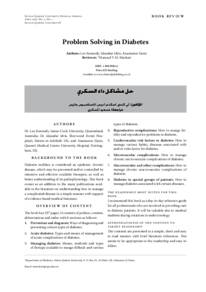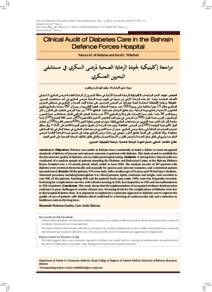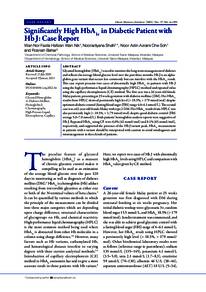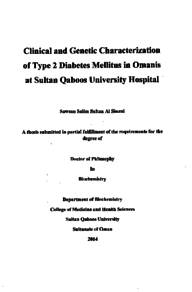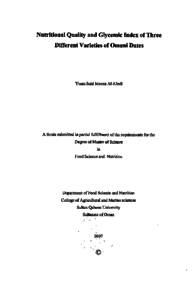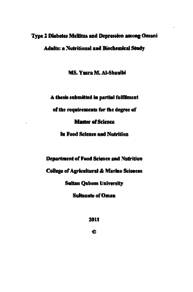Document
Development and validation of a diabetes knowledge and attitudes questionnaire
Publisher
Sultan Qaboos University
Gregorian
2015
Language
English
Subject
English abstract
Background: Diabetes is a chronic disease, if not managed properly it can lead to a long term complications, Oman is undergoing a rapid economic development leading to urbanization and modernization and it faces the challenge of a growing problem of diabetes. Diabetes management requires medical care and regular self control. Education is an integral part in the diabetes health care services. As patients are empowered with knowledge improvement in clinical outcomes and quality of life are seen. Internationally, knowledge of patients with diabetes and their attitudes, on different aspects of diabetes self-management, have been assessed using variable validated questionnaires In the few studies assessing diabetes in Oman, none have reported on the validity and reliability of their questionnaires. All these studies only reported on very narrow aspects of the knowledge related to diabetes self-management (long-term complications, symptoms of hypo- and hyperglycemia, and sources of carbohydrate in foods). Previous research on diabetes neglected to give a total picture of all aspects of diabetes self management as recommended in diabetes guidelines. Aim; Therefore, the aim of the study was to establish the reliability and validity of a comprehensive questionnaire assessing the knowledge on diabetes self-management and attitudes about diabetes education in a sample of patients with type 2 diabetes. Method: The study was carried out by a quantitative statistical method of questioning. A questionnaire was developed with three sections; knowledge about diabetes, attitude about diabetes education and patients' information (socio-demographic information and biochemical and anthropometric data). Face and content validity was assessed by a panel of experts. The reliability was tested via test-retest and Cronbach's alpha for assessing the internal consistency of the questionnaire. The criteria related validity was also measured using biochemical, anthropometric and demographic criteria. In total, 101 patients from Al-Khuwair Health Center, Muscat, were interviewed for criteria related validity. Results: Face and content validity was established between 7 to 9 experts out of 9 experts agreed on the quality of the questionnaire. Reliability was also established by test-retest (r). The test-retest correlation coefficient ranged from 0.7 to 0.9. The internal consistency Cronbach alpha was above 0.6 for all DKAQ subscales. However, the selected criteria (HbA1c, TG, LDL, HDL, BMI, WC, and gender) could not distinguish the knowledge level between the groups of patients with type 2 diabetes. There was a significant difference only in the mean percentages of knowledge about diet between patients with regards to their total cholesterol. Those with better total cholesterol have better knowledge. Additionally, there was a significant difference between male and female in two attitude subscales: confidence about diabetes knowledge and perception of the importance of diabetes education. In these two subscales, males had higher levels of confidence about diabetes knowledge and perception of diabetes education. Conclusion: DKAQ is a reliable tool based on test-retest reliability, and internal consistency. Also, it is valid based on face and content validity
Arabic abstract
السكري مرض مزمن قد يؤدي الى تطورتدريجي لمضاعفات صحية في حالة عدم ضبطه. وبما أن السلطنة تشهد تطورا اقتصاديا سريعا أدى إلى التحضر و التمدن ، صاحبه في ذلك الزيادة في معدلات الإصابة بالسكري بين أفراده، والذي يتطلب ضبطه بالرعاية الطبية والتحكم الذاتي المستمر اثبتت الدراسات أن التعليم و التثقيف الصحي جزء لا يتجزا من خدمات الرعاية الصحية لمرضى السكري حيث إن التعليم / التثقيث الصحي عمليه مستمره تهدف لتمكين الفئة المعنية بالمعارف و المهارات اللازمة للتحكم الذاتي بالسكري، وقد بينت الدراسات بأن تمكين مرضى السكري أدى الى تحسن في النتائج السريرية و جودة الحياة . وقد قامت الدراسات الأجنبية بقياس الجوانب المعرفية المتعلقة بجوانب مختلفة التحكم الذاتي بالسكري لدى المصابين واتجاهاتهم باستخدام استبيانات مدروسة ومختبرة من ناحية الثبات والصدق. هناك عدد قليل جدا من الدراسات التي أجريت لتحديد المستوى المعرفي لدى مرضى السكري في عمان، ولم تشر أي من هذه الدراسات الى صدق و ثبات الاستبيانات المستخدمة ، كما أن تلك الدراسات اقتصرت على جوانب محددة في نطاق الجوانب المعرفية المتعلقة بالتحكم الذاتي للسكري (مضاعفات السكري على المدى البعيد ،اعراض انخفاض و ارتفاع سكر الدم ، و مصادر الكربوهيدرات في الأطعمة). و بهذا لم تقيم هذه الدراسات معرفة المرض في جميع الجوانب المختلفة المتعلقة بالتحكم الذاتي للسكري والتي تنادي بها خطط ومبادي الرعاية الصحية لمرض السكري
الهدف: لذا تهدف هذه الدراسة لقياس صدق و ثبات استبيان شامل التقييم معرفة المرضى في جوانب التحكم الذاتي للسكري واتجهاتهم حول التعليم / التثقيف عن السكري لدى عينة من العمانيين المصابين بالنوع الثاني من السكري
آلية العمل: يتكون الإستبيان الذي تم تصميمه من 5 جزئيات، وهي: المعرفة ، الاتجاهات تجاه مستوی التعليم التثقيف عن السكري، البيانات الديموغرافية، معدلات المؤشرات الجسمانية ونتائج الفحوصات الإكلينيكية بعدها تم تحكيم صدق وثبات الإستبيان خلال ثلاث مراحل. شملت المرحلة الأولى التحقق من الصدق الظاهري و محتوى الاستبيان (face and content validity) ، وشملت الفئة المستهدفة لهذه المرحلة المختصين من الأطباء و الممرضين و فنيي التغذية الذين يعملون في عيادات السكري في المراكز الصحية الأولية. أما المرحلة الثانية فهی عبارة عن دراسة الاتساق الداخلي (internal consistency) للإستبيان و موثوقية إعادة التجارب ( test - retest reliability ). أما المرحلة الثالثة تم فيها قياس صدق الاستبيان بأستخدام اسلوب المحك (criterion validity) وذلك باستخدام محك مؤشر كتلة الجسم (BMI) و محيط الخصر والسكر التراكمي (HbA1c) و مؤشرات دهون الدم ، ونوع الجنس. وقد استهدفت هذه المرحلة 101 مصاب بالنوع الثاني من السكري من مركز الخوير الصحي. بحيث تم اختيار المصابين بنفس الأسلوب في المرحلة السابقة
النتائج: ما بين سبعة إلى تسعة خبراء من أصل التسعة خبراء أجمعوا على قدرة الاستبيان لقياس معرفة مرضى السكري حول السكري وقدرته على قياس اتجاهات المرضي حول التعليم التثقيف عن السكري، كما أنهم أكدوا على وضوح الأسئلة وقدرة المرضى على فهمها. كذلك تأكد موثوقية إعادة التجارب للاستبيان فقد كانت العلاقة بين التجربة الأولى والثانية علاقة قوية جدا واضحة أحصائيا ( test - retest reliability ) حيث كان معامل الإرتباط (r) يتراوح بين 0 . 7 إلى 0 . 9 لمعظم أقسام الأستبيان. كذلك بالنسبة للاتساق الداخلي فإن كل عنصر في الاستبيان له علاقة قوية مع باقي الأسئلة في قسمة فكان مؤشر کرونباخ ألفا لكل اقسام الاستبيان أعلى من0. 6. اما بالنسبة لقياس الصدق باستخدام محك، فان المحكات المستخدمة لم تستطع تمييز المرضى حسب مستويات معرفتهم واتجاهاتهم. و لكن محلك الكلسترول الإجمالي استطاع أن يميز المرضى الذين لديهم معرفة أكثر حول التغذية ، حيث إن الأشخاص الذين لديهم معدل مرغوب من الكلسترول تبين أن لديهم معرفة أعلى من التغذية. كذلك محك نوع الجنس استطاع أن يميز بان الذكور يتميزون عن الاناث بفرق واضح أحصائيا في مستوى ثقتهم حول معلوماتهم عن السكري واعتقادهم بأهمية التعليم حول السكري.
الخاتمة: الاستبيان المستخدم في هذه الدراسة حقق موثوقية عالية من خلال مقياس إعادة التجارب ومقياس الإتساق الداخلي كما أنه حقق درجة عالية من الصدق الظاهري.
الهدف: لذا تهدف هذه الدراسة لقياس صدق و ثبات استبيان شامل التقييم معرفة المرضى في جوانب التحكم الذاتي للسكري واتجهاتهم حول التعليم / التثقيف عن السكري لدى عينة من العمانيين المصابين بالنوع الثاني من السكري
آلية العمل: يتكون الإستبيان الذي تم تصميمه من 5 جزئيات، وهي: المعرفة ، الاتجاهات تجاه مستوی التعليم التثقيف عن السكري، البيانات الديموغرافية، معدلات المؤشرات الجسمانية ونتائج الفحوصات الإكلينيكية بعدها تم تحكيم صدق وثبات الإستبيان خلال ثلاث مراحل. شملت المرحلة الأولى التحقق من الصدق الظاهري و محتوى الاستبيان (face and content validity) ، وشملت الفئة المستهدفة لهذه المرحلة المختصين من الأطباء و الممرضين و فنيي التغذية الذين يعملون في عيادات السكري في المراكز الصحية الأولية. أما المرحلة الثانية فهی عبارة عن دراسة الاتساق الداخلي (internal consistency) للإستبيان و موثوقية إعادة التجارب ( test - retest reliability ). أما المرحلة الثالثة تم فيها قياس صدق الاستبيان بأستخدام اسلوب المحك (criterion validity) وذلك باستخدام محك مؤشر كتلة الجسم (BMI) و محيط الخصر والسكر التراكمي (HbA1c) و مؤشرات دهون الدم ، ونوع الجنس. وقد استهدفت هذه المرحلة 101 مصاب بالنوع الثاني من السكري من مركز الخوير الصحي. بحيث تم اختيار المصابين بنفس الأسلوب في المرحلة السابقة
النتائج: ما بين سبعة إلى تسعة خبراء من أصل التسعة خبراء أجمعوا على قدرة الاستبيان لقياس معرفة مرضى السكري حول السكري وقدرته على قياس اتجاهات المرضي حول التعليم التثقيف عن السكري، كما أنهم أكدوا على وضوح الأسئلة وقدرة المرضى على فهمها. كذلك تأكد موثوقية إعادة التجارب للاستبيان فقد كانت العلاقة بين التجربة الأولى والثانية علاقة قوية جدا واضحة أحصائيا ( test - retest reliability ) حيث كان معامل الإرتباط (r) يتراوح بين 0 . 7 إلى 0 . 9 لمعظم أقسام الأستبيان. كذلك بالنسبة للاتساق الداخلي فإن كل عنصر في الاستبيان له علاقة قوية مع باقي الأسئلة في قسمة فكان مؤشر کرونباخ ألفا لكل اقسام الاستبيان أعلى من0. 6. اما بالنسبة لقياس الصدق باستخدام محك، فان المحكات المستخدمة لم تستطع تمييز المرضى حسب مستويات معرفتهم واتجاهاتهم. و لكن محلك الكلسترول الإجمالي استطاع أن يميز المرضى الذين لديهم معرفة أكثر حول التغذية ، حيث إن الأشخاص الذين لديهم معدل مرغوب من الكلسترول تبين أن لديهم معرفة أعلى من التغذية. كذلك محك نوع الجنس استطاع أن يميز بان الذكور يتميزون عن الاناث بفرق واضح أحصائيا في مستوى ثقتهم حول معلوماتهم عن السكري واعتقادهم بأهمية التعليم حول السكري.
الخاتمة: الاستبيان المستخدم في هذه الدراسة حقق موثوقية عالية من خلال مقياس إعادة التجارب ومقياس الإتساق الداخلي كما أنه حقق درجة عالية من الصدق الظاهري.
Description
Thesis
Member of
Resource URL
Same Subject
